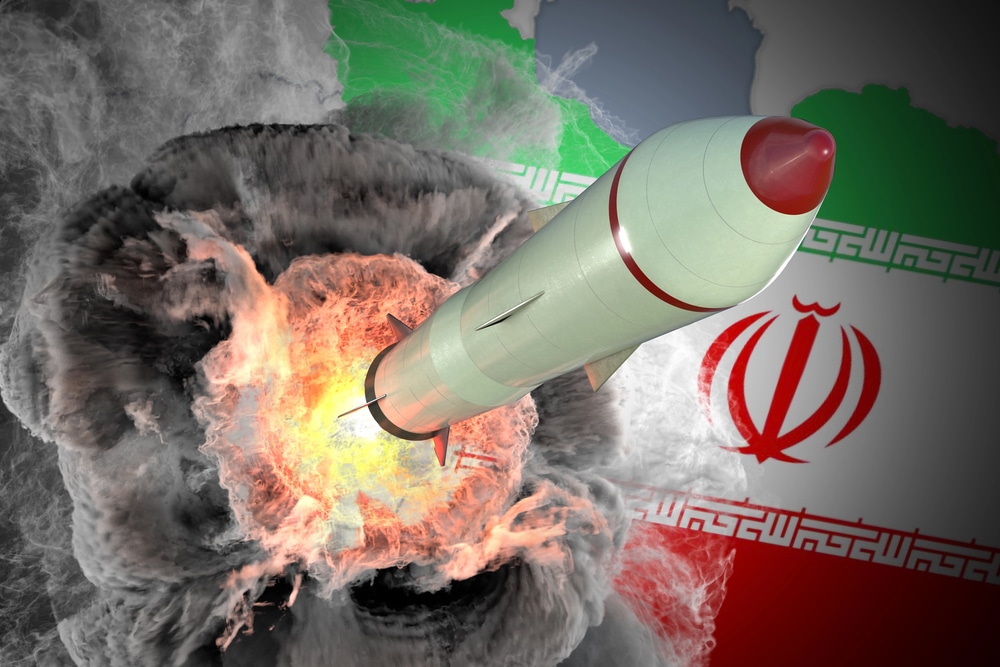President-elect Donald Trump has reportedly expressed concern that Iran could develop a nuclear bomb on his watch. In considering his options to prevent that, The Wall Street Journal reports that Trump is considering airstrikes on Iranian nuclear facilities.
Being open to such an action is not inconsistent with Trump’s character or past performance. General Mark Milley, who served as chairman of the Joint Chiefs of Staff in the first Trump administration, says he feared that Trump would launch missile strikes on Iran that could trigger an all out war. “If you do this,” Milley told him, “you’re gonna have a fucking war.”
The Journal reports that, given the weakened position of Iran after the taking apart of its front line proxy defense and deterrent in Lebanon and Syria, “[t]he military-strike option against nuclear facilities is now under more serious review by some members of his transition team.” Military considerations are still in their “early stages” and could change as the transition team solidifies into a fixed cabinet.
But that Trump is considering bombing Iranian nuclear facilities because he is concerned that Iran could build a nuclear bomb during his term as president is laden with hypocrisy almost too obvious to mention. There are three glaring hypocrisies.
The first is that Iran’s potential pathway to a nuclear bomb was diplomatically blocked in 2015 when the Barack Obama administration joined the United Kingdom, France, Germany, Russia and China in signing the Joint Comprehensive Plan of Action (JCPOA) nuclear agreement with Iran. The deal was a success. Its pathways to a bomb were closed.
For all the complexity of the negotiations, for all the complexity of the clauses, the deal was pretty simple: if Iran keeps its promise to limit its civilian nuclear program, the United States would keep its promise to lift sanctions. Iran did; the U.S. didn’t. In 2018, Trump unilaterally and illegally pulled the U.S. out of the JCPOA nuclear agreement.
As long as Iran was in compliance with the limitations on its nuclear program, the United States was obliged to honor its commitments under the agreement and hold back on sanctions. If Iran was not in compliance, then—and only then—could the U.S. pull out of the agreement and snap back sanctions. But Iran was completely and consistently in compliance with their commitments under the agreement, as verified by eleven consecutive International Atomic Energy Agency reports.
So, there would be no risk of Iran developing a nuclear bomb during Trump’s second term had Trump not killed the JCPOA nuclear deal in his first term.
The second hypocrisy is that there is no intelligence basis for Trump’s concern nor for his consideration of airstrikes on Iran. Trump has no reason to believe that Iran is currently building a nuclear bomb.
There was no reason to believe that leading up to the JCPOA nuclear agreement either. The 2007 National Intelligence Estimate (NIE), representing the collective conclusions of all of America’s many intelligence agencies, said with “high confidence” that Iran was not building a nuclear weapon. The 2011 NIE said that “the bottom-line assessments of the [2007] N.I.E. still hold true. We have not seen indications that the government has made the decision to move ahead with the program.” In 2012, former CIA director and then-Secretary of Defense Leon Panetta asked, “Are they [Iran] trying to develop a nuclear weapon?” and succinctly and pointedly answered: “No.”
And there is still no reason to believe that after the American withdrawal from the JCPOA nuclear agreement. The 2022 U.S. Department of Defense Nuclear Posture Review concludes that “Iran does not today possess a nuclear weapon and we currently believe it is not pursuing one.” In 2023, CIA Director William Burns said that “[t]o the best of our knowledge, we don’t believe that the supreme leader in Iran has yet made a decision to resume the weaponization program.” Burns said the same thing a year later in October 2024; “No, we do not see evidence today that the supreme leader has reversed the decision that he took at the end of 2003 to suspend the weaponization program…We don’t see evidence today that such a decision [to build a bomb] has been made. We watch it very carefully.”
So, Trump is considering airstrikes on nuclear facilities to prevent activity that the U.S. intelligence community and the U.S. Department of Defense are telling him is not happening.
The third is the hypocrisy of considering pre-emptively bombing a sovereign country while lecturing the world on international law.
The United States has attempted to rally the world behind it in alliance against Russia’s violation of Ukraine’s sovereignty and territorial integrity. U.S. President Joe Biden called Russia’s attack on Ukraine “an assault on the very principles that uphold global peace.”
But the United States long ago substituted the rules-based order for international law. Here the United Nations is instrumentalized by the U.S. when it advances the American agenda and disregarded by the U.S. when its laws stand in its way. The U.S. now consistently applies international law inconsistently, prioritizing its own foreign policy interests over universal application of international law.
There is brazen hypocrisy in condemning Russia for violating Ukrainian sovereignty and territorial integrity while defending America’s right to violate Iran’s by bombing it pre-emptively when there has been no Iranian attack or threat of attack on the United States.
Richard Falk, professor emeritus of international law at Princeton University, once told me in the context of a different U.S. threat against Iran, that “a pre-emptive war against Iran because it seemed to be crossing or had crossed the nuclear threshold would be contrary to the substantive provisions of the UN Charter and international law.”
Such a hypocrisy could have consequences for the United States beyond Iran. Bombing Iran’s civilian nuclear facilities may finally and radically challenge the reign of the rules-based order and American hegemony. Just as America’s demonstration of its capacity to weaponize the international financial system against Russia panicked other countries and pushed them to explore alternative financial architectures to protect themselves from U.S. financial warfare, so the abuse and double standards of the rules-based order demonstrated by bombing Iran may force countries to explore alternative international architectures that stress multipolarity and the reestablishment of the primacy of the United Nations to protect themselves against U.S. military warfare.
Much in Donald Trump’s White House is still in flux, and it is premature to assume that he will give serious consideration to airstrikes on Iran. But if the consideration that is in the early stages by Trump’s transition team survive into his fixed cabinet and evolve into serious consideration, that consideration would be laden with hypocrisy that could harm the United States as much as it harms Iran.
































